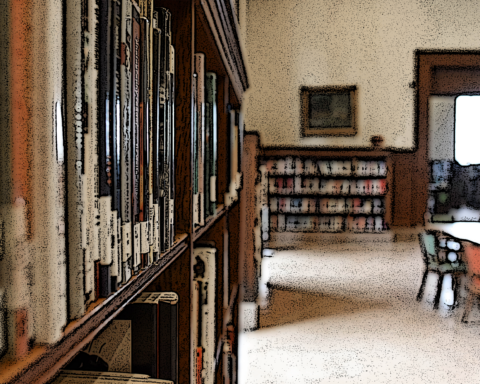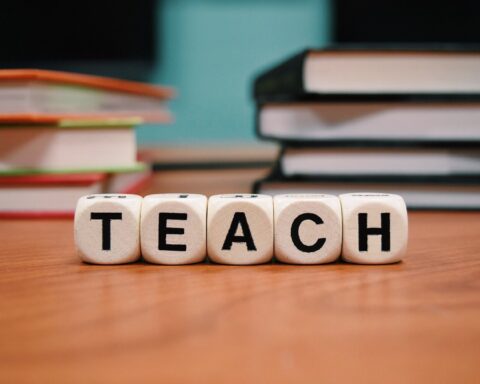
Reformed Christians have worked tirelessly to establish and strengthen universal public education in every nation and time where they have found themselves. This work has been inspired by theological beliefs that have been part of our tradition since the momentous Consistory meeting that established the Reformation and instituted universal public schooling in Geneva.
Vocation
Prior to the Reformation, the Church was viewed as a hierarchy of clergy, somewhat distinct from the world. Clergy were entrusted with sacred truth so that they could mediate God’s salvation to the people. In this system, it was important for the clergy to be educated for their priestly work and relatively unimportant for laity to be able to read and interpret the Bible or know much doctrine. In contrast, the more democratic church that emerged during the Reformation understood that lay and clergy alike were called to and ordained to the highest office in the church, that of elder. This new understanding of the church required an educated laity.
___________________________________________
The democratization of the church and the affirmation of the ordinary life were spurs to universal public education. People needed to be educated in order to fulfill their callings in the church and in the world.
___________________________________________
The Reformation propelled another shift in the understanding of Christian vocation. Rather than idealizing the monastic life as the purest form of service to Christ, Reformed Christians affirmed ordinary life (of family, work, and politics) as the place where Christians were to live out their vocations. Ministry ceased to be viewed as a higher calling, but rather as one calling among many. One can find sermons delivered by Puritans that go so far as to claim that God is just as pleased with a good round of dishwashing as with the delivery of a fine sermon.

The democratization of the church and the affirmation of the ordinary life were spurs to universal public education. People needed to be educated in order to fulfill their callings in the church and in the world. From this new, Reformation perspective, humans are born unfinished and educators are called to participate in God’s creative work, forming human beings who can live out our vocations to the glory of God. The goal of education was for people to know Bible and theology, as well as mastering mundane skills such as reading and computation, so that they could live their lives as parents, shopkeepers, magistrates, and church members.
Armed with this conviction, Presbyterians and other Reformed Christians were at the forefront in every state to establish universal public education. Very often they found themselves working against Christians with other ideas on the matter. In Virginia, for example, Scotch-Irish Presbyterians in the Valley of Virginia had to confront the Tidewater Episcopalian aristocracy in order to establish common schooling. The great historian of American public education, Lawrence Cremin, notes that Presbyterian and Congregational clergy not only led this fight, but were almost always the first State Superintendents of public schools after public education was instituted.
Sources of Religious Knowledge
 In his monumental work, Puritan Boston and Quaker Philadelphia, Digby Baltzell, points to another doctrinal impetus to public education. He contrasts the very early adoption of universal public education in Massachusetts with the much, much later adoption of universal public education in Pennsylvania. (Pennsylvania was the last state north of the Mason-Dixon Line to adopt public schooling.) He credits this phenomenon to the difference in the way(s) God is known in the Puritan and Quaker religious traditions.
In his monumental work, Puritan Boston and Quaker Philadelphia, Digby Baltzell, points to another doctrinal impetus to public education. He contrasts the very early adoption of universal public education in Massachusetts with the much, much later adoption of universal public education in Pennsylvania. (Pennsylvania was the last state north of the Mason-Dixon Line to adopt public schooling.) He credits this phenomenon to the difference in the way(s) God is known in the Puritan and Quaker religious traditions.
Establishment Quakers in Pennsylvania emphasized that people know God by the inner light of the Holy Spirit. This approach relegates external sources of knowledge such as scripture and confessions to a secondary role. The result is a kind of intuitionism, wherein the uneducated can know God’s will as well, and possibly better, than the educated.
___________________________________________
This covenantal understanding of society has led Presbyterians to view education as more than a parental responsibility. The belief that God has bound our lives together in society means that the responsibility for education lies upon us all.
___________________________________________
By contrast, our Reformed brothers and sisters, establishment Congregationalists in Boston, emphasized external sources of knowledge: scripture, tradition, and even the natural world. They believed there was little true theological understanding apart from the Bible and the teachings of the church, and they were particularly suspicious of private revelations. This emphasis on external sources of knowledge – and the importance of proper understanding and interpretation of these sources – provided a religious impetus to make schooling available to everyone.
 Baltzel notes that on the surface, the Quaker belief that everyone has the inner light of the Holy Spirit appears more democratic, especially when one considers that Puritan Boston developed an educated elite. However, in practice, the lack of common schooling in Pennsylvania perpetuated the marginalization of the poor and people of color.
Baltzel notes that on the surface, the Quaker belief that everyone has the inner light of the Holy Spirit appears more democratic, especially when one considers that Puritan Boston developed an educated elite. However, in practice, the lack of common schooling in Pennsylvania perpetuated the marginalization of the poor and people of color.
Furthermore, the Reformed belief that everyone could be educated tended to open opportunities for promising students from all of backgrounds and is why scholarships and sponsorships have always been part of this tradition. Yes, there was an elite, but it was not a closed system. One reason it was not a closed system is the idea that our lives are bound together with others in a political covenant, or federation.
Covenant
From Samuel Davies’ work as an evangelist among the slave populations of pre-colonial Virginia, to the establishment of Presbyterian high schools and colleges among free-blacks after the Civil War, to controversial stands (among the white establishment) favoring the integration of the schools during the Civil Rights Era, to continued declarations of support for public education after prayer and bible-reading were eliminated from public schools, Presbyterian work promoting universal public education has been propelled by a covenantal understanding of society.
 Our English word “covenant” translates the Hebrew word “b’rit,” which means, “to bind.” It signifies the way our lives are bound together with others – in families, in larger societies, in the whole of creation – and ultimately with God. These binding ties give rise to obligations. “Obligation,” is a good covenant word; in the middle of it stands the word “ligament,” which refers to the sinews that bind our lives to the lives of others.
Our English word “covenant” translates the Hebrew word “b’rit,” which means, “to bind.” It signifies the way our lives are bound together with others – in families, in larger societies, in the whole of creation – and ultimately with God. These binding ties give rise to obligations. “Obligation,” is a good covenant word; in the middle of it stands the word “ligament,” which refers to the sinews that bind our lives to the lives of others.
This covenantal understanding of society has led Presbyterians to view education as more than a parental responsibility, which is too often limited by parents’ own sinful whims as well as their limited economic and intellectual capacity. The belief that God has bound our lives together in society means that the responsibility for education lies upon us all. From a Reformed theological perspective, universal education is a common good.
Current Challenges
This idea that public education is a common good has been under assault for the past 20 years. It has been weakened all along by the racism that has lingered after Jim Crow and continues to segregate public schooling along racial lines. It has been weakened by recent cuts to state spending on education, especially cuts that impact poorer school districts. The novel notion that education is a competitive good, an idea that has inspired proposals to reform public education by bringing market forces to bear, has challenged it. [1] The attack on education as a public good is on full display in proposals that would dismantle the public education system and yet make little or provision for the populations they would leave behind.

Some of this opposition comes from libertarians who claim education is a private rather than a public good. Broadly speaking, libertarians understand individuals as separate and distinct from the larger society. They talk about money, wealth, and responsibility in ways that sound as if we are self-made and answerable only for our own lives. From the libertarian point of view, society is a collection of individuals, each seeking his or her private good. Libertarians claim that society will flourish to the extent that individuals are free to pursue their own private goods, unhindered.
In contrast to this hyper-individualism, the covenantal view maintains that people are best understood in relationship with God and others. A covenantal understanding not only accounts for the ways our lives our bound together, it declares this a source of blessing. For example, without discounting hard work and initiative, a covenantal view observes that we can only create wealth in concert with others. We need others – with whom we divide labor in society, with whom we trade, with whom we create laws that secure property rights and ensure contracts, with whom we share the rich heritage of civilization and continue to generate new knowledge and technology, and with whom we build infrastructure and support a common defense.
___________________________________________
As we consider the continuing challenges to American public schooling, we do well to retrieve this covenantal understanding that education is a common good.
___________________________________________
From this perspective, education is a societally significant activity that we do together. The fact that nobody ever accomplished anything without an education is a rather clear refutation of the idea that people are self-made. Furthermore, it points to our obligation to pass that education on to the next generation and to share it with those who are less advantaged.
 The notion that education is a common good is also currently being undercut by a growing economic disparity that makes students into educational “haves” and “have-nots.” The children of the poor often go to public schools where less than $10,000 is spent per student, while the children of the middle class attend schools in a neighboring district that may spend $20,000 or more per student. [2] The disparity is even greater when one considers that some private schools, such as one near where I live, claim to spend, on average, $43,900 per student.
The notion that education is a common good is also currently being undercut by a growing economic disparity that makes students into educational “haves” and “have-nots.” The children of the poor often go to public schools where less than $10,000 is spent per student, while the children of the middle class attend schools in a neighboring district that may spend $20,000 or more per student. [2] The disparity is even greater when one considers that some private schools, such as one near where I live, claim to spend, on average, $43,900 per student.
Perversely, the struggles of poorer school districts (in terms of spending and of students served) are often touted as if they tell the whole story about public education. This serves the desire of some critics to undermine the public’s confidence in their ability to educate. Of course, not all critics of public education are trying to destroy public education. There is waste and entrenched mediocrity that needs to be addressed, [3] and these efforts at reform should not be confused with those who are intent on destroying trust in public education as an institution.
As we consider the continuing challenges to American public schooling, we do well to retrieve this covenantal understanding that education is a common good. From such a perspective, it is a waste to bar anyone from the full expression of their humanity by allowing their God-given talent to go uncultivated. It is sinful to deliberately under-educate a particular population, prolonging their ignorance, perpetuating their subjugation, and leaving them unable to fully participate in or contribute to the larger society. It is wrong to diminish our common life by allowing any portion of society to go undereducated.
_____________________________________________
[1] One of the early proposals of this sort was John E. Chubb and Terry M. Moe, Politics, Markets and America’s Public Schools, (Washington D.C.: Brookings Institution, 1990). The problem with market proposals is that the “markets” are so imperfect as to be virtually non-existent. School location, differences between classroom teachers in the same school, the value of putting siblings in the same school, transportation barriers, the lack of meaningful ways to evaluate schools, erode the concept of a perfect market where parents are empowered to exercise choice in a way that can improve school performance.
[2] It is tricky to compare per-student spending across districts. Some districts have expensive bussing costs; others do not. There are variations in costs of living and other factors. These differences mean that the portrait that emerges from this comparison is painted with a very broad brush; still, the picture that emerges is one of inequality.
sssssThat said, in some states poorer districts spend more than wealthier ones. For example, Camden, NJ, spends approximately $24,000 per student. By contrast, Westfield, NJ, spends approximately $16,000 per student, less than the state average. Despite this disparity, Westfield has been recognized as one of the top school districts in the country. This is because money is not the only factor in ensuring a quality education. In particular, it is not nearly as important as the education level of the parents and the culture of learning that surrounds the school. One historian observed while the 17th and 18th century Scottish public schools were “run on oatmeal,” they still produced the highest literacy rate in Europe.
sssssWhile conservatives are right that we cannot solve the problems of America’s public schools by throwing money at them, we should admit that money does play a role. Wealthy people who move to expensive school districts or pay tuition are not stupid.
[3] I am thinking here of then-Governor Bill Clinton’s attempt to make all public school teachers in Arkansas pass an 8th grade literacy test, which was met with howls of protest and cost him re-election. The experience of is another example of how difficult it can be to reform some public school systems.
*****
AUTHOR BIO: Raymond R. Roberts has a Ph.D. from Union Presbyterian Seminary. He is the pastor of the Presbyterian Church in Westfield and author of the book, Whose Kids Are They Anyway? Religion and Morality in America’s Public Schools.
sdf
Read more articles from this issue: Pedagogy for the Distressed!





Unbound Social